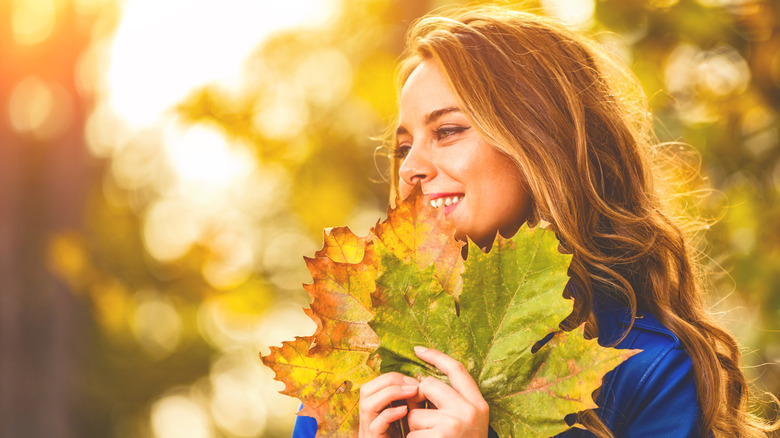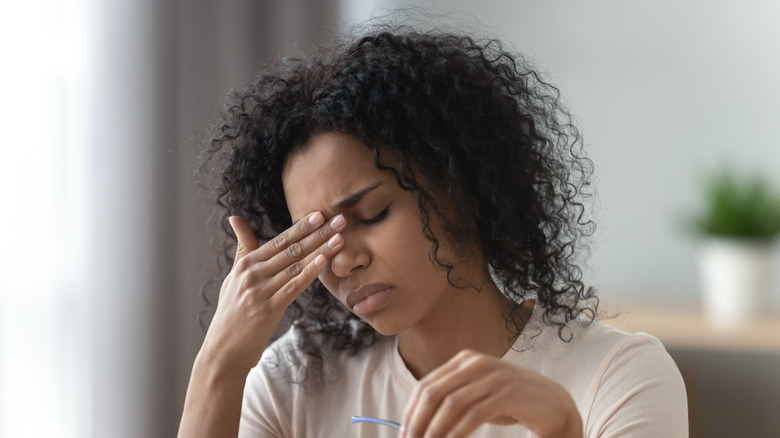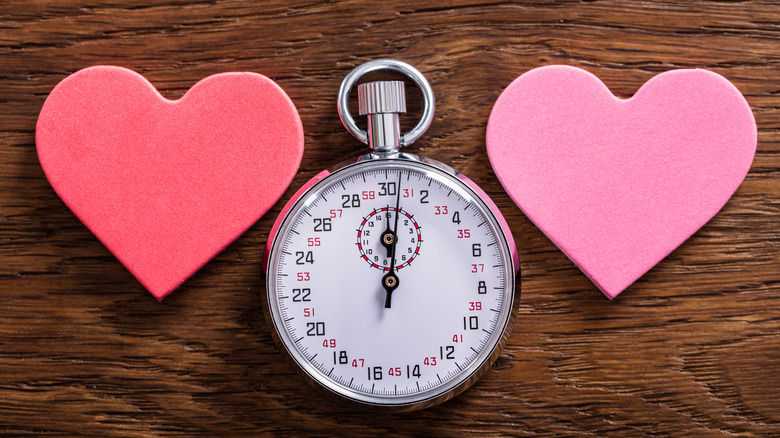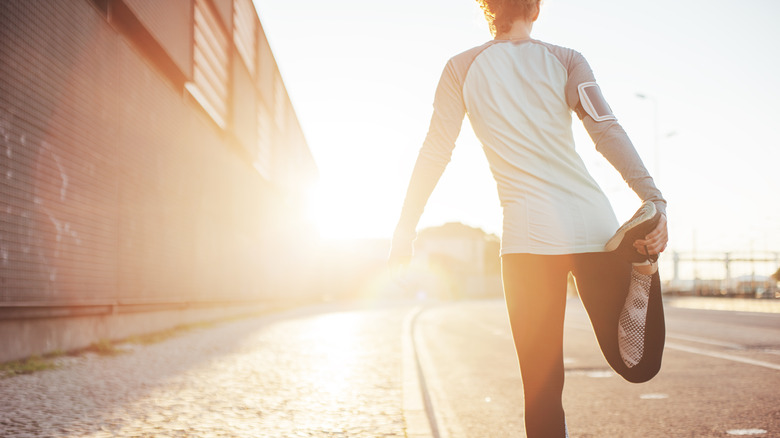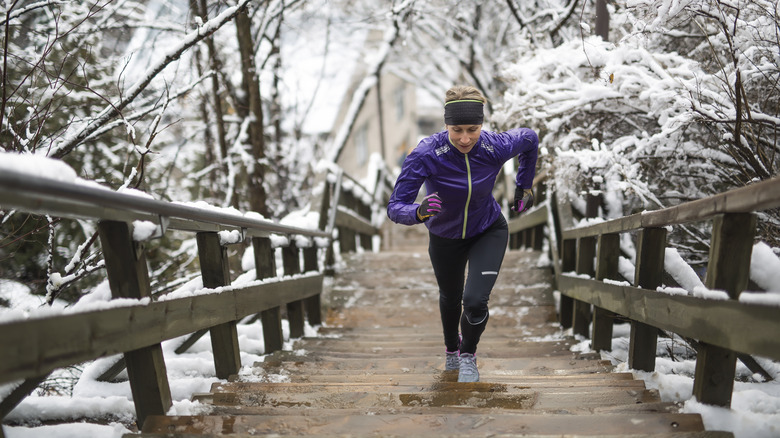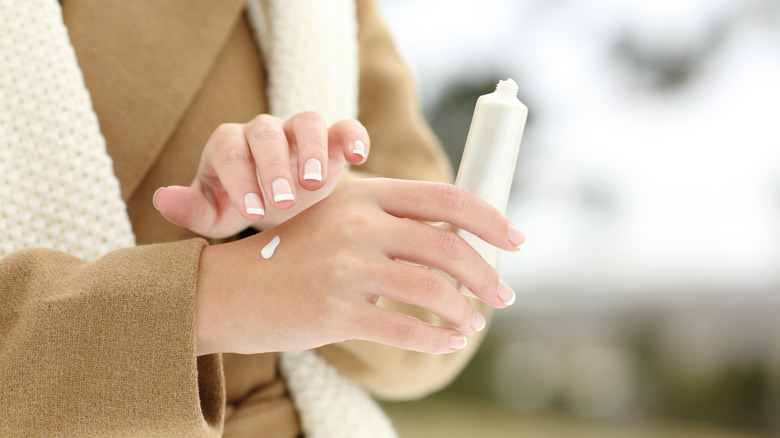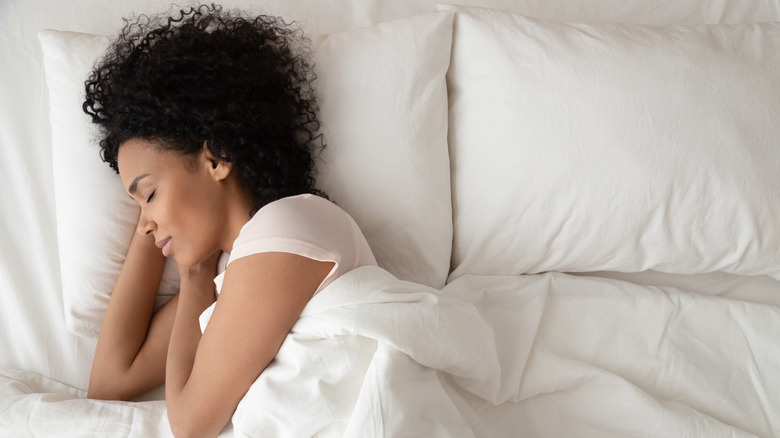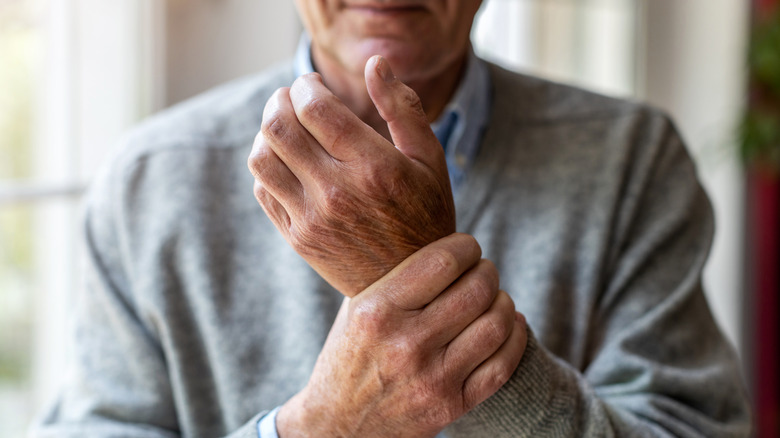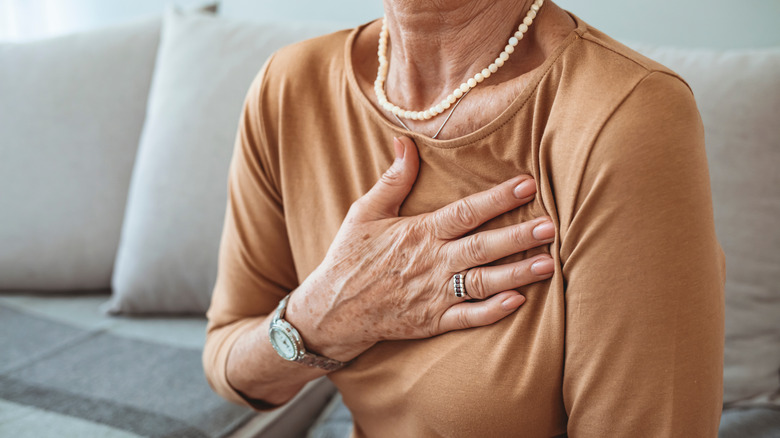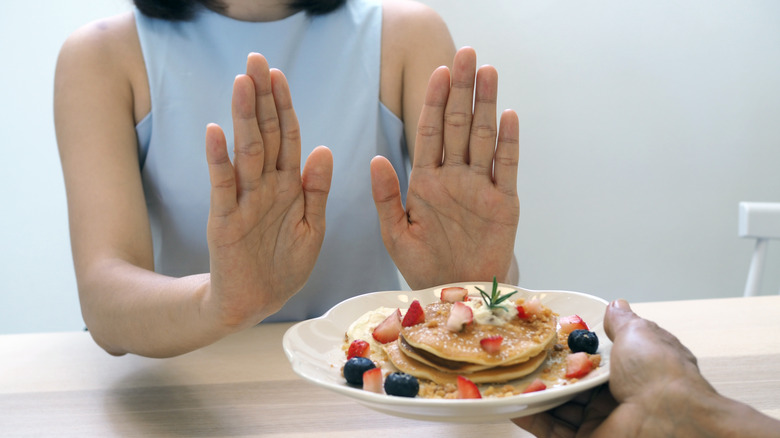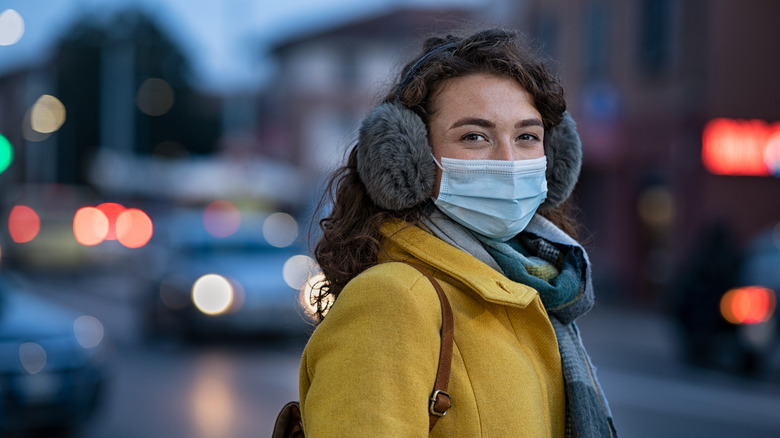When The Weather Changes, This Is What Happens To Your Body
Flowers blooming at the start of spring, the first snowfall in winter, leaves turning brown as Thanksgiving approaches ... we all know the feeling of the weather changing, and how it can shake things up in our lives.
What we can also sometimes be aware of is a physical sense of things being a little different when this happens, and sometimes it's a little difficult to put our finger on why that is. "Changes in weather are basically challenges to our immune system and to our musculoskeletal system," family medicine physician Vikash Modi told Piedmont Healthcare. When the weather changes, our bodies change too, adapting to our new environments to keep our lives in harmony and our bodily systems working correctly.
And sometimes, our bodies undergo changes that are pretty wild — and pretty extreme. From spring to summer, fall to winter, we've taken a look at the interesting changes that happen to your body when the weather starts to turn, and anything you need to watch out for when this happens.
When it gets colder, you get more headaches
Most of us have experienced the dreaded brain freeze from scarfing cold ice cream too quickly at some point or another. Well, as it turns out, cold weather can induce a similar painful sensation in your head and, in both situations, it's down to your blood vessels.
With a brain freeze, your body reacts to the extreme cold by quickly expanding the blood vessels in your brain to create warmth, inducing pain (per the Cleveland Clinic). When it's cold outside, though, the opposite can happen. "One of the causes of headaches is constriction of blood vessels in the brain," said Tri-City Medical Center internist Xiang Li to Women's Health Magazine. "Cold weather can cause blood vessels to quickly narrow, reducing the flow of blood."
When this happens, headaches can occur and, in more extreme circumstances, cold weather can cause migraines, which can be decidedly more difficult to deal with. Migraines can also be triggered by other weather changes, like particularly stormy weather or bright sunlight. If you notice that you're experiencing head pain during cold weather or any other weather change, it's worth keeping a note of any triggers you notice and discussing them with your doctor to determine a course of action.
When it gets hotter, your heart's behavior changes
If you've ever exercised in particularly hot weather, you'll probably have noticed how hard your heart is working. In fact, your heart works harder during hot weather, whether you're exercising or not, to help your body keep cool, said Kim Knowlton, a assistant clinical professor a the Mailman School of Public Health at Columbia University, to Health. "Your heart beats faster in order to pump overly warm blood from your body's core out to the skin's surface," Knowlton stated. Once there, the blood can cool down more effectively, keeping your body at a regulated temperature.
This elevated heartbeat is largely normal, as it's a natural physical reaction to heat. But, if you're concerned about your ticker beating a little faster, make sure to take regular precautions during hotter weather, like not over-exerting yourself and staying well-hydrated. It's also interesting to note that people who live in urban areas may experience higher heartbeats more noticeably, as air pollution and smog, which can get worse the hotter it is, can affect your cardiovascular system, said NYU Langone Medical Center cardiologist Jonathan Newman. Protecting your heart by following a heart-healthy lifestyle can help it stay prepared for hotter weather.
When the weather gets colder, our muscles get tighter
Feeling a little stiffer in the winter months? You're not alone. When it's colder outside, our muscles and joints can have a tougher time and tighten up, according to WebMD. This is because cold weather causes our muscles and joints to lose heat, which then makes them contract and lose motion and flexibility. This also means that our nerves can become pinched more easily, according to Vivian Eisenstadt, an orthopedic physical therapist who practices in Los Angeles.
The cold weather and this tightness mean that our muscles have to work a lot harder, which can cause them to become damaged or painful more easily. "It is normal to feel muscle soreness for a few days after exercise, especially if it is a different type of activity or at a more intense level than your body is used to," said Pilates instructor and physical therapist for ARC Physical Therapy, Amy McDowell. If, as McDowell said, you notice that you're sorer in colder months after doing your regular exercise, you might need to accommodate for this by warming up more comprehensively before you work out.
When the spring weather comes, you have more energy
With the spring weather might come a spring in your step (we're so sorry — the wordplay was too good to pass up) with increased energy as the weather gets a little warmer. The biology behind this is fascinating: according to Sanford Auerbach, director of the Sleep Disorders Center at Boston University, as the daylight hours get longer, the retina in our eyes react to the change and the increased light, as noted by WebMD. This then causes our levels of melatonin, the hormone in our body that helps to regulate mood and sleep cycles, to be inhibited, as the Sleep Foundation states.
The less melatonin we have, the more alert and awake we are; or, as Auerbach put it, "there's more daylight, so people have more energy, [and] sleep a little less." The opposite is true of the winter months when our body produces more melatonin, meaning we sleep more. This can also cause a higher likelihood of lowness of mood and depression during cold, dark months, as people can experience seasonal affective disorder (or SAD). If you're experiencing symptoms of depression or SAD during colder periods, speak to a healthcare professional.
When the weather gets colder, you burn more calories
Our bodies are burning energy 24 hours a day, and how much energy we burn is not only affected by our level of physical activity, but also the temperature outside. Colder weather can cause our bodies to have to work harder to keep warm, raising our basal metabolic rate, according to a study conducted by the University of Utah, which found that colder environments result in a higher calorie expenditure, as reported via The New York Times. The same is also true if you wear light clothes instead of wrapping up warm, as your muscles will work harder to warm up your body through contracting and expanding (also known as shivering).
However, don't count on this making a huge change to the calories you burn. According to NYU Langone Health clinical instructor of internal medicine Albert Ahn, "it's not significant enough to notice a difference" (per HuffPost). Regular exercise is a far more efficient way of burning calories and far less dangerous than not dressing appropriately for cold weather, which can result in various medical problems, including hypothermia.
When it gets hotter, you might find it harder to figure stuff out
When the mercury rises, completing some tasks can become an Everest-sized struggle, to which anyone who's able to cast their mind back to doing math in a hot classroom can testify. Well, you might be pleased to know that it's not just because you were feeling a bit lazy: cognitive function can be less sharp when it's particularly warm outside, according to a study conducted by researchers at Harvard University.
The study looked at the effect of heat waves on our ability to complete cognitive tasks, and showed that factors such as reaction time and speed of information processing were slower for participants who lived in environments without air conditioning. The study authors suggest that a few factors, such as decreased sleep quality and hydration during hotter spells, could be behind this. In some of the tests, cognitive function was decreased by a whole 13%, which is a fact that you can definitely use next time your boss asks you to get that paperwork done in the sweltering heat.
When it gets colder, your skin health can suffer
It's sometimes easy to forget that our skin is the largest organ of our bodies, spanning a massive 20 square feet of matter constantly reacting to our environments (per WebMD). And when it gets cold, our skin (one of the first lines of defense in our bodies) can react quite strongly. "As the weather cools, there's less moisture in the air, which in turn provides less moisture to the skin," said Beverly Hills-based board-certified dermatologist Tsippora Shainhouse to Women's Health. Less moisture means less hydration; less hydration means dryer, itchier skin.
In addition to the cold air, blustery winter weather can also cause your skin to suffer. "Strong winds will dry and irritate the skin and potentially damage the skin's protective lipid barrier," said Shainhouse. To counteract this in the winter, exfoliate gently twice a week to remove any dead skin cells and keep your skin healthy. Shainhouse also suggests using a humidifier in your bedroom, which can "help replenish moisture to your skin while you sleep," particularly when you're heating your home to fight the big chill.
During weather changes in fall, you may be more sexually active
The sexual behavior of humans is affected by many factors, and one of the most interesting of these is the weather. Due to hormonal changes that occur with changing seasons, sexual activity can be particularly heightened during fall months, particularly for males, according to co-author of the book "The Body Clock Guide to Better Health" and University of Texas-Houston School of Public Health professor Michael Smolensky, reports WebMD.
"When we look at couples who have kept diaries of sexual encounters and single males who have kept their own data, sexual activity is really rather low in the spring," said Smolensky, who notes that this information contradicts the notion that spring is the most sexually-active season. "The peak is in the fall," he said, potentially because, for men, testosterone levels are generally higher in the summer and autumn months. Smolensky suspects that the reason for this might have been hard-wired into our brains from hunter-gatherer days. "Given the fact that mammals have a longer gestation period, it's best to conceive in the fall and deliver in the spring, when the supply of nourishing food supplies would be supportive of offspring," he states. "It may be a naturally selective thing that became ingrained in the genetics of human beings."
When it gets colder, your hair and nails can get weaker
Let's be real: cold weather ain't the most nourishing for our beauty regimen. When it gets colder, not only can our skin health suffer, but our hair and nail health can, too. "In cold weather, the small blood vessels on your skin, fingers, and toes become narrow," said Tri-City Medical Center internist Xiang Li to Women's Health, "reducing the flow of blood and the delivery of nutrition and oxygen." When the nutrients and oxygen can't get to our nails and hair in ample quantities, they can dry out and become weaker.
In addition to this, colder air temperatures can affect your nails in a similar way to your skin, drying them out, making the areas around your nails and nailbeds more prone to cuts or nicks. Your best solution for this (as for many things in cold weather) is to dress warm, so that blood can move more easily around your body. Using a humidifier around the house is also a great way to maintain moisture levels in the air, stopping your nails from getting too dry.
When the weather changes to fall, you begin to sleep more
Finding it harder to get out of bed in the winter is something to which pretty much everyone can relate. There's good research to show that the urge to sleep more in winter, largely due to limited light exposure and the hormonal balances that change as a result (per the Sleep Foundation), is a common occurrence.
In fact, over half of adults have reported sleeping over two hours more per night during the fall and winter months, according to a study published in the Journal of Psychosomatic Research. This tendency to sleep more, often coupled with increased drowsiness throughout the day, is known as hypersomnia. While hypersomnia can be coupled with seasonal affective disorder, it can also be a sign of several underlying conditions, like chronic fatigue syndrome, kidney failure, or Parkinson's disease, according to Healthline. If you suspect that excessive sleepiness, even during the winter months, could be something more than a change in the seasons, it could be useful to discuss it with your doctor.
Changes in weather can affect joint pain
Concerns about joint pain due to a change in the weather are almost as old as time. There's a rising understanding of how cold or rainy weather can affect your joints and cause pain, particularly for people who already have arthritis. "Weather changes actually can affect chronic pain — specifically joint pain," said pain management specialist Robert Bolash, to the Cleveland Clinic. Bolash is clear that there's far from a scientific consensus on this, but, he said that "the anecdotal evidence is significant in leading us to think achy joints and rainy days are related."
One reason for this could be due to changes in barometric pressure, as WebMD states. When the pressure in the air decreases, two things happen: the weather gets worse, and there's less air pressure on our bodies. This can cause our joints to swell, causing discomfort and pain, particularly in people with pre-existing conditions. Colder temperatures can also be a common suspect for joint pain, and this isn't helped by the fact that, when the weather's bad, we move around less, meaning our joints can stiffen and become more painful. The solution? Stay limber and warm as much as possible when cold, consider anti-inflammatory pain medication, and consult with a medical professional if the pain is persistent.
When it gets colder, your risk of cardiovascular issues could increase
While weather changes can affect our bodies in small ways, they can affect them in big ones too. One of the biggest changes, when it comes to cold weather, in particular, is an increased risk of cardiovascular issues. This is all due to how our bodies manage temperature, said NYU Langone Health clinical instructor of internal medicine, Albert Ahn, to HuffPost. "This increased risk isn't just due to exertion because you're shoveling snow. When the body is trying to preserve heat, it does increase the pressure on the heart," Ahn said. "It has to work harder to pump blood to extremities. It can also increase blood pressure marginally."
The increase in cardiovascular risk due to cold weather is confirmed by a study published in the European Heart Journal. The study, which looked at 23,000 participants, found increased blood pressure, as well as increased death from cardiovascular disease, during winter. Although the study specifically looked at individuals with pre-existing cardiovascular issues, and Ahn confirms that cardiac concerns are generally more common in the winter for those who are at risk, it's something that everyone should keep in mind.
When it gets warm, our appetite decreases
In the depths of summer, the thought of a big meal can be a real turn-off. That's largely due to the change in weather, which affects our appetite due to how our body seeks to regulate its core temperature. According to St. Catherine University's director of Nutrition and Dietetics Debra Sheats (via CBS Local), "When it's hot out, our body temperature is close to the environmental temperature, so we don't have to burn as many calories to maintain our temperature." As a result of this, our metabolisms slow down, and "our appetite goes down, too," said Sheats.
As Sheats states, because our bodies are having to use less energy to keep us warm, we burn around 10% fewer calories in the summer than we do in the winter. This also changes the type of food we want to consume. We tend to veer away from warmer, denser foods and opt for lighter items and food and drink which we associate with coolness and hydration, according to registered dietitians Marissa Puelo and Lisa Cohn, for Medical Daily.
When it gets colder, your body can have a harder time breathing
Although we can frequently associate shortness of breath with balmy summer months, when the weather turns cold it can also cause respiratory issues. This is due to the effects that colder air can have on our small airway, with the coldness causing muscle spasms when it comes into contact with it, narrowing the passage and causing shortness of breath, said Women's Health. There's also, naturally, the wealth of respiratory illnesses that can circulate during the winter months, causing a wide variety of breathing issues.
A solution for this is familiar to anyone who's lived through the COVID-19 pandemic (so ... most of us): wearing a face mask when you leave the house. "The mask covers your mouth and uses the heat from your breathing to warm the air before it enters your lungs," which then causes less impact on your airways, said Tri-City Medical Center internist Xiang Li. If you didn't have enough reason to keep your mask on before, there's one more for you.
